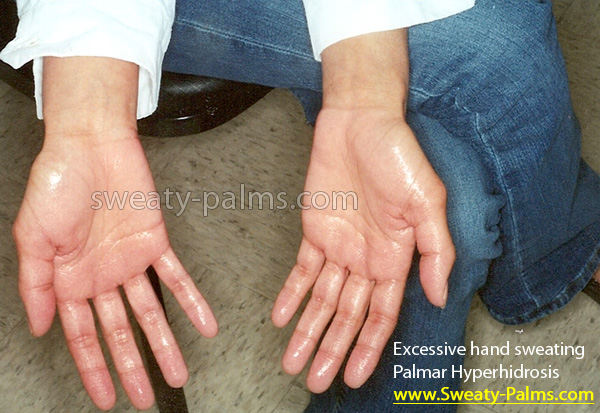Recognizing Excessive Sweating: Dermatology Insights on How to Stop Sweaty Hands
Recognizing Excessive Sweating: Dermatology Insights on How to Stop Sweaty Hands
Blog Article
Understanding the Origin Causes of Excessive Sweating and Its Influence On Life
While it is frequently understood as a physical feedback to manage body temperature level, the triggers for excessive sweating can differ commonly among individuals, incorporating not just physical aspects but emotional and additionally emotional components. By delving into the root causes of hyperhidrosis and exploring its complex effects, a deeper understanding of this prevalent concern can be gained, dropping light on the complexities that individuals grappling with excessive sweating navigate on a daily basis.
Physiology of Sweat Glands
The guideline of sweat manufacturing, an important physical procedure, is mostly controlled by the task of gland distributed throughout the human body. Gland are classified into two primary kinds: eccrine and apocrine glands. Eccrine glands are one of the most many and are discovered in nearly all areas of the body. They play an important duty in thermoregulation by secreting a watery fluid onto the skin's surface, which evaporates and assists cool down the body down. In comparison, apocrine glands are concentrated in locations rich in hair follicles, such as the armpits and groin, and their secretions are thicker and milklike in appearance.
When the body temperature level increases, either as a result of physical task, high temperatures, or psychological tension, the anxious system causes the gland to produce sweat. This sweat is made up primarily of water and electrolytes like sodium and chloride. The process of sweat manufacturing is necessary for preserving the body's internal temperature within a slim, optimum range, highlighting the essential function gland play in human physiology.
Triggers for Excessive Sweating
In understanding the source of excessive sweating, it is critical to recognize the triggers that can lead to this physical action. Too much sweating, also understood as hyperhidrosis, can be prompted by numerous variables, both physiological and environmental. One typical trigger is emotional stress and anxiety or anxiousness, which can boost the body's gland to generate more sweat than is essential for cooling. Physical effort, high temperatures, and spicy foods are also known to set off excessive sweating in individuals susceptible to this condition. Moreover, particular medical conditions like hyperthyroidism, menopause, or diabetic issues can add to too much sweating also.
Furthermore, drugs such as some antidepressants, opioids, and particular supplements can likewise work as triggers for hyperhidrosis. Comprehending these triggers is important in taking care of excessive sweating properly - Exessive Sweating. By identifying and addressing the details triggers that motivate too much sweating in an individual, health care carriers can establish customized therapy strategies to ease this problem and enhance the individual's quality of life
Medical Issue Associated
Related to extreme sweating are numerous medical conditions that can exacerbate this physiological response. One common problem is hyperhidrosis, a condition identified by abnormally raised sweating that goes beyond the body's thermoregulatory demands. This can show up in focal locations like the hands, soles, underarms, or face, impacting a person's quality of life because of social humiliation and pain.
Furthermore, endocrine disorders such as hyperthyroidism, diabetes, and menopausal warm flashes can additionally lead to extreme sweating. Hyperthyroidism triggers an overproduction of thyroid hormones, accelerating metabolic rate over at this website and causing sweating.
Additionally, infections like endocarditis, hiv, and consumption have been connected with evening sweats, an usual sign known to disrupt rest and impact overall health. These clinical conditions highlight the varied series of underlying factors that can check my reference add to extreme sweating, necessitating thorough analysis and administration by healthcare specialists.
Emotional and emotional Factors

Effect on Social Interactions
Extreme sweating can have profound results on an individual's capacity to engage comfortably in social communications. The visible signs of sweat spots or wet spots on clothes can lead to humiliation and self-consciousness, causing people to withdraw from social circumstances. This withdrawal can impact connections, limit social activities, and prevent personal and specialist growth.

Additionally, the anxiousness and self-esteem problems coming from too much sweating can affect communication and interpersonal abilities. People might struggle to concentrate on conversations, join group tasks, or share themselves confidently. This can result in sensations of seclusion and loneliness, as social connections become testing to maintain.
Conclusion

While it is commonly understood as a physical feedback to manage body temperature level, the triggers for extreme sweating can vary commonly among people, incorporating not just physical aspects however also emotional and emotional elements. By diving right into the root causes of hyperhidrosis pop over to these guys and discovering its diverse impacts, a deeper understanding of this prevalent problem can be acquired, shedding light on the intricacies that individuals grappling with excessive sweating browse on an everyday basis.
Physical exertion, high temperatures, and spicy foods are additionally understood to trigger too much sweating in individuals prone to this problem. By determining and addressing the details triggers that trigger excessive sweating in a specific, health care service providers can create individualized treatment strategies to reduce this problem and enhance the person's high quality of life.
Too much sweating can have profound results on an individual's capacity to engage comfortably in social interactions.
Report this page